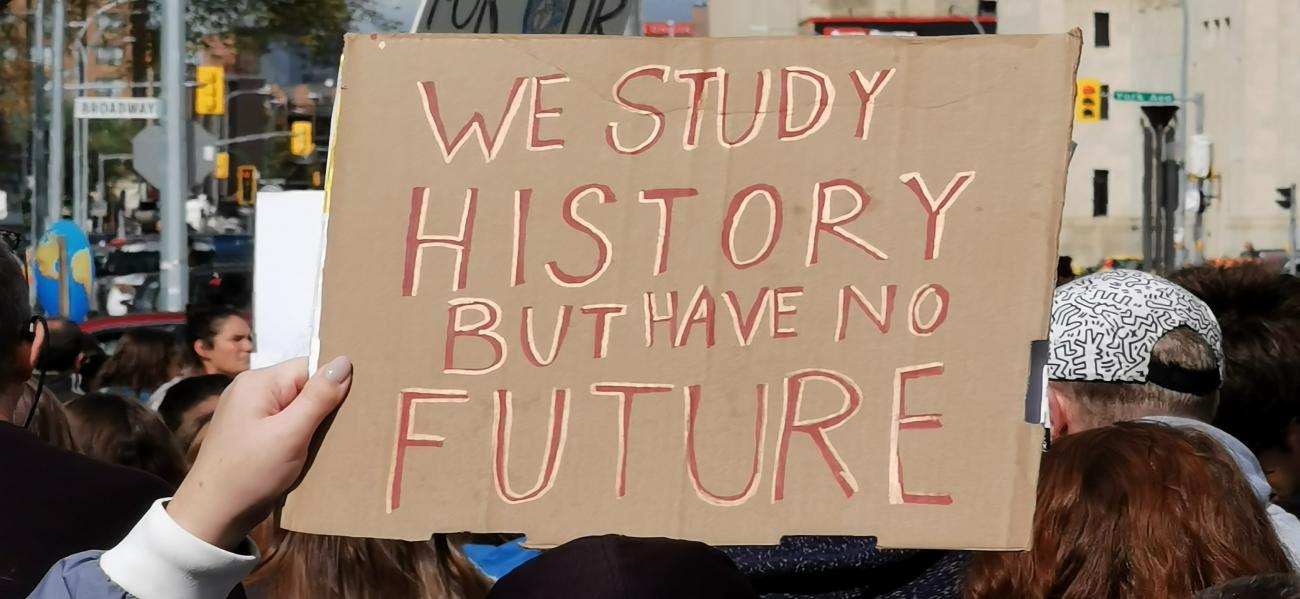On Friday, September 27, thousands of young activists gathered at the steps of the Manitoba Legislature to strike for climate action. In the last week of September, an estimated 7.6 million people around the world, representing 185 different countries, skipped school and work and took to the streets.
Some Niverville residents joined in on the strike action in Winnipeg, hoping to sway political leaders to take action.
Jeffrey Bergen attended the rally along with four fellow students and his teacher, Miss Marion, of the Global Issues class at Niverville High School.
“It was one of the greatest experiences and feelings I’ve ever had,” says Bergen. “I can’t describe in words how joyful it made me to see that many people stand up for theirs and their children’s future.”
Climate change, Bergen says, is the current focus of his Grade Twelve Global Issues class. Learning about climate change and the potential outcomes it could have on mankind’s future has given him a profound desire to make a difference in his world.
“I love this planet,” Bergen says. “I don’t believe it’s ours. I believe we are simply here to take care of it and to learn from it, and that’s what… the climate [movement] is all about—to take care of this planet, respect it, love it, and don’t kill it.”
But there’s another reason Bergen felt compelled to exercise his right to strike that day. The very next day, on September 28, Bergen took his oath of Canadian citizenship.
“[It] encouraged me to show the true Canadian within me by participating in something that I felt every Canadian should be a part of,” Bergen says. “Having the privilege of living in such a beautiful and free country deserves involvement and participation from fellow Canadians.”
Bryanne Koehn works in Winnipeg and decided to show her support at the student strike that afternoon, too. Someday in the future, she says, she wants to look back and know that she was on the right side of history.
“I have a tremendous amount of hope in the youth of today,” Koehn says. “They play an imperative role because they are young enough to be passionate, they commit wholeheartedly, and just give a damn while still being mature enough to be aware of what’s going on globally.”
As well, she says, they aren’t constricted by bills, debt, or responsibilities, leaving them free to follow their minds and hearts.
As a mother of two, Koehn worries for her children’s future and admits that she has numerous friends who have chosen not to become parents because of the uncertainty that lies ahead in the face of a climate crisis.
And while apathy towards the climate crisis may be a large part of the issue, Koehn says the energy and passion she witnessed at the student strike was astounding. People of all ages and walks of life were there to support the youth-led cause.
Many carried signs to drive their point home to local politicians. They said, If you were smarter, we’d be in school. Another sign bore pictures of obituaries and read, They died of old age, I will die of climate change.
For Koehn and others, climate action isn’t about passion so much as it is about logic and reasoning.
“The science and the facts are there,” Koehn says. “Climate change doesn’t give a crap about your opinion about it. It’s happening. And one day our kids and our grandkids will ask us what we did to protect the only home we have….We do not inherit the planet from our ancestors, we borrow it from our children.”
Corporate greed and ignorance, she says, are what stand in the way of immediate and significant action.
“Frankly, the planet will be fine,” she adds. “The earth has experienced global cooling and warming before, and it will recover. But we won’t. Not because we are technologically incapable, but because the people with the most power and sway are driven by greed and ego, and prone to self-destruction. If we took all of the tools and knowledge we have today and made choices based on scientific understanding and resources, we could do a complete 180 and heal the planet and care for everything on it.”
In her own way, Koehn’s been trying to practice an environmentally sustainable lifestyle for years. She gardens, protects pollinating insects, composts and recycles waste, finds low-emission ways to travel, conserves water, and encourages her family members to do the same.
The climate strike, she says, has only buoyed her determination and reminded her of the importance of being more outspoken on the subject.
“It’s easy to hide behind a keyboard or surround yourself with an echo chamber,” Koehn says. “It’s a lot harder to stand up for what is right in [public]. We’re not your enemy. These young kids aren’t your enemy. We just want to live on a healthy planet. I don’t understand why some people make it their mission to fight against hope and idealism.”


